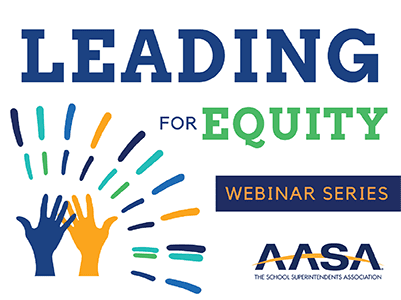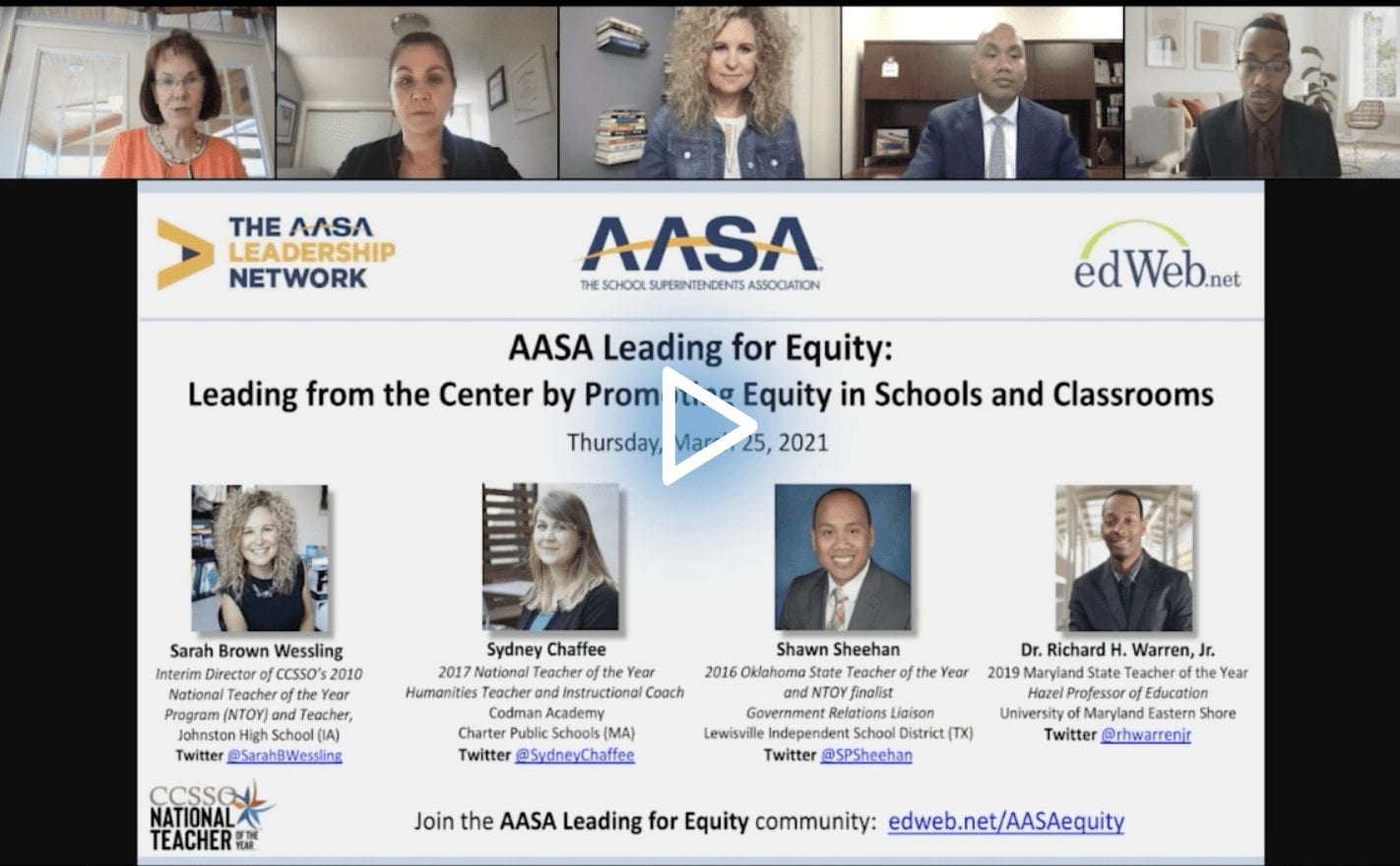Teachers of the Year Doing Equity Work: What, How, and Why
By Robert Low
Being a teacher during a pandemic may seem challenging enough without taking on potentially divisive political and social issues, but for three teachers who were recently named the Teacher of the Year in their states, working on equity issues with their students is a crucial part of the job and well worth the effort.
These honored educators explained what they are doing and why, during a recent edWebinar hosted by AASA, The School Superintendents Association and AASA’s Leadership Network. The panel members were Sydney Chaffee, a Humanities Teacher and Instructional Coach at Codman Academy Charter Public School (MA), Shawn Sheehan, Government Relations Liaison for the Lewisville Independent School District (TX), and Dr. Richard H. Warren, Jr., now Hazel Professor of Education at the University of Maryland Eastern Shore (MD).
As Dr. Warren pointed out, today’s students are likely to be learning and eventually working with diverse peers who have different cultural backgrounds and lived experiences, so being able to understand and respect different perspectives, as well as communicate and collaborate effectively, will be essential skills for students’ long-term success.
Diverse Pathways Toward Equity
For Chaffee, equity work means making sure her interdisciplinary high school humanities classes, which combine history and literature, are rooted in justice and the empowerment of all her students. During the 2020 elections, she taught a civics unit focused on what the government should be and do, and the students’ work included analyzing the actual words of opposing candidates. Students then wrote a persuasive letter to a voter they knew, explaining which candidate they supported and why, including text evidence to support their opinions.
Chaffee and her students have also focused on how policies and practices can help people remain well during the pandemic. This work led to activities such as helping people get groceries. It also included developing a more holistic view of students as members of families and communities, and consideration of policies that were flexible enough to meet diverse needs and ensure students in different situations were receiving an equitable education.
Sheehan’s path has led him from being a math teacher working with students who have special needs to now serving as a government liaison for a school district. In this role, he is helping the district and its educators leverage existing legislation and the ongoing policy-making process to protect and advance equity for all students. This can include supporting bills in some cases and trying to stop them in others, as well as trying to obtain funding needed to provide an equitable education.
Dr. Warren’s work now includes analyzing what school districts are spending their Title II and other professional development funds on to determine how much of a financial commitment is being made to providing a culturally responsive curriculum, implementing equitable practices, and recruiting and mentoring a diverse faculty. He is also teaching dual enrollment courses that help high school students earn early college credits which help the students become certified teachers.
The Process of Doing Equity Work
According to the panel members, equity work is not a linear process, and the auditing of oneself and one’s school system should be a starting point, but also remain an ongoing part of the work. On a personal level, educators should consider not only who and where they are but also how they were able to reach the position they now have. This sort of personal equity audit should include consideration of lived experiences and how they have shifted a person’s perspective in regard to teaching.
When examining a school system, key questions include how diverse cultures and perspectives are represented in the curriculum. There also needs to be a focus on district policies and the actual practices that can be observed when visiting a classroom in order to ensure diverse students are not only treated equitably but also have a voice in what they learn and are empowered to obtain an education that meets their needs and goals.
Sheehan believes educators have a responsibility to educate their larger community so there is appropriate support and funding for an equitable education. This can include written communication like letters and media posts, but he has found speaking directly and developing personal relationships with community members, as well as with participants in the legislative process, can have a greater impact.
Doing the Work Successfully
In order to proceed with equity work that may be controversial, the panelists recommended inviting administrators into the conversations, as well as union representatives if appropriate. Reaching out to school board members and local legislators can be important steps in building support, getting feedback, and finding allies.
Sheehan suggested reaching out to unexpected allies, which can include chambers of commerce and other community organizations that have an interest in developing a well-educated local workforce.
Dr. Warren emphasized the importance of establishing connections with parents or guardians by asking how best to support their children. Building that sort of partnership can not only improve the educational outcomes for students but also help teachers accomplish their equity goals and avoid ending up in vulnerable situations. As Dr. Warren put it, “We the people are stronger together,” and educational equity strengthens students, schools, and the workforce.
Reflecting on the importance of equity work and why it should be happening in classrooms, Chaffee explained it as a way teachers and students can work together to make the world a better place.
This edWeb broadcast was hosted by AASA, The School Superintendents Association and AASA’s Leadership Network, providing premier professional learning for educational leaders.
About the Presenters
Sydney Chaffee
Sydney Chaffee is a National Board Certified Teacher with a passion for helping diverse learners grow through authentic, relevant, interdisciplinary curricula. Sydney believes that education is an essential tool to work towards social justice. It can transform students’ self-perceptions and arm them to fight for a more just world. Throughout the school year, Sydney and her students seek to answer big questions: What is justice? How have people resisted injustice throughout history? What power do people have to change the world?
In addition to teaching, Sydney has served as Humanities Department Chair, co-coordinator of a weekly all-school Community Circle, and a mentor teacher for pre-service teachers from Tufts University and Boston University. Outside of school, Sydney was a part-time faculty member at Boston University’s School of Education, a Teach Plus Policy Fellow, an edX Policy Fellow, and facilitator of a Boston Educators Collaborative course that brought together teachers from district, charter, and parochial schools to collaborate on curriculum design.
As 2017 Massachusetts Teacher of the Year, Sydney appreciated the opportunity to collaborate with her colleagues across the state, advocate for the profession to be elevated and respected, and continue to learn from her students. As 2017 National Teacher of the Year, she was able to speak to a wider audience about the value of public education for all students, the possibilities of integrating arts education into traditional academic disciplines, the importance of teacher learning, and the role of education in social justice movements.
Shawn Sheehan
Shawn Sheehan is the government relations liaison for Lewisville ISD in Lewisville, Texas. He has taught math in Texas and Oklahoma and is the 2016 Oklahoma Teacher of the Year. In 2018, Shawn worked in a congressional office on Capitol Hill as an Albert Einstein Distinguished Educator Fellow. Shawn earned his BA in journalism at Arizona State University and his M.Ed. in special education at the University of Oklahoma. A strong advocate for improving public education, Shawn has been featured on CBS This Morning, NPR, and The Economist.
Dr. Richard H. Warren, Jr.
Dr. Richard H. Warren, Jr. is the 2019 Maryland State Teacher of the Year and a nationally awarded STEM innovator. In fact, Samsung named him “one of the leading solve for tomorrow teachers in the United States.” He has nearly a decade of teaching experience and holds a Bachelor of Science, master’s in teaching, and doctorate in educational leadership from the University of Maryland Eastern Shore. In February 2019, Dr. Warren was inducted into the University of Maryland Eastern Shore’s Hall of Excellence, the highest honor of achievement offered by the University.
As the eighth-grade science teacher at Crisfield High School and Academy, Dr. Warren led the school’s first-ever STEM program, an award-winning program he designed to meet the challenges of the global society through innovation, collaboration, and creative problem solving. His students were selected as state finalists out of 3,000 applicants in the national Samsung STEM competition. Dr. Warren has been recognized statewide as a top educator by the Maryland State Department of Education and Maryland General Assembly with honors in both the House of Delegates and State Senate.
He is an expert in teacher retention where he has compiled, written, and published over 150 pages of literature and recommendations to school districts that are implementing mentoring programs for beginning teachers. Since 2015, he has worked closely with district teacher mentoring programs, helping beginning teachers find success and gratification in the classroom. Dr. Warren frequently travels around the world as a featured and keynote speaker. He has delivered multiple keynotes, one of note being at the 2018 Maryland State Education Association (MSEA) Convention reaching over 14,000 video views. On April 6, 2019 he delivered his first TEDx Talk, “Breakthrough Teaching: Reimaging Teachable Moments.”
Dr. Warren currently serves as the Hazel Professor of Education at the University of Maryland preparing future teachers to take on the next generation of students, with a special emphasis on educating male students of color to become K-12 teachers. Dr. Warren’s work with students, teachers, and state departments has become well known in the educational world and beyond.
About the Moderator
Sarah Brown Wessling is the interim director of the CCSSO’s National Teacher of the Year Program (NTOY). Sarah is the 2010 National Teacher of the Year and has worked with the NTOY Program as a facilitator, designer of professional learning and consultant for the past 10 years. Sarah is also a 23-year veteran of the high school English classroom and former Teacher Laureate for the Teaching Channel. She is a National Board Certified Teacher since 2005 and serves as the vice chair for the NBPTS Executive Board. Sarah is a frequent speaker and facilitator of professional learning around the country and a devoted blogger and writer. Follow Sarah on Twitter @SarahBWessling and on Instagram @sarahbrownwessling.
Join the Community
Leading for Equity is a free professional learning community on edWeb.net for school and district leaders who face many challenges leading schools and driving school improvement for all students, especially now with COVID-19.
The AASA Leadership Network drives superintendent success, innovation, and growth, shaping the future of public education while preparing students for what’s next. We are the largest, most diverse network of superintendents in America. Passionate and committed, we connect educational leaders to the professional learning, leadership development, relationships, and partnerships they need to ensure a long career of impact.
Robert Low has more than 30 years of educational publishing experience, ranging from editing and product management to online advertising and content development. He also works with edWeb.net to write articles on their professional learning edWebinars.






Comments are closed.